Qualifying For FHA Loan After a Loan Modification
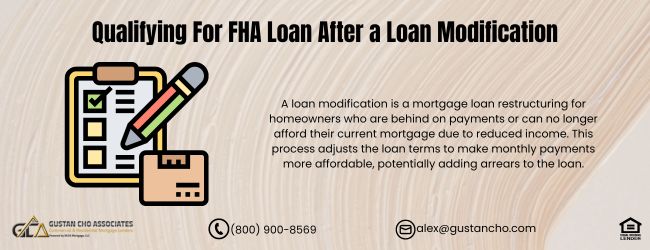
This guide covers qualifying for an FHA loan after a loan modification. Homeowners who had a loan modification in the past often get conflicting answers when they consult with a loan officer about qualifying for an FHA loan after a loan modification. To get an approve/eligible per Automated Underwriting System, mortgage applicants need 12 months of timely payments on their monthly payments that report on their credit report. One 30 day mortgage late payment is allowed to get approve/eligible per AUS.
Most lenders that grant a loan modifications often have homeowners skip multiple mortgage payments in order for loan modifications to go through.
This is the reason why under HUD Guidelines, a 12 month waiting period after loan modification is required to qualify for FHA loans. However, many banks and mortgage lenders treat loan modifications the same as foreclosures. Oftentimes, these lenders will require a three-year waiting period after modification. This is not the case and is not under HUD Guidelines. This requirement is a lender overlay imposed by a particular lender. Gustan Cho Associates is a national lender with no mortgage overlays on government and conventional loans. In the following paragraphs, we will cover qualifing for an FHA loan after a loan modification.
What Is a Mortgage Loan Modification?
A loan modification is when homeowners are behind on mortgage payments where it is next to impossible to catch up and/or can no longer afford current mortgage payments because of a reduction in income. A loan modification is different than a repayment workout plan where a borrower can make a payment agreement with the mortgage payments that they are currently behind. A loan modification is the restructuring of the mortgage loan. The arrears are added back to the loan. The terms and rates of mortgage loans are restructured where monthly payments are affordable. Lenders are more apt to do a loan modification for their borrowers if the borrowers qualify instead of going through foreclosure proceedings.
How Can I Qualify For an FHA Loan After a Loan Modification
Qualifying for an FHA loan after a loan modification involves meeting specific criteria set by the Federal Housing Administration (FHA) and lenders. Here are the key points to consider. Generally, there is a mandatory waiting period of 12 months from the date of the last loan modification. Some lenders require a longer period, typically up to 24 months. Speak With Our Expert for qualify for an FHA loan after loan modification
FHA Loan After a Loan Modification Credit Requirements
It would help if you had a minimum credit score 580 to qualify for the 3.5% down payment option. For those with scores between 500-579, a 10% down payment is required. Your credit report must show an improved payment history post-modification.
FHA Loan After a Loan Modification Financial Stability of Borrowers
Your DTI ratio, which compares your monthly debt payments to your gross monthly income, should ideally be below 43%, though some lenders may accept higher ratios with compensating factors. Steady employment and verifiable income are crucial. Lenders want a stable employment history and sufficient income to cover mortgage payments. You must provide documentation of the loan modification, such as the modification agreement, proof of on-time payments since the modification, and other standard mortgage application documents like tax returns, W-2s, pay stubs, and bank statements.
FHA Loan Limits and Property Requirements
The FHA loan amount you can qualify for depends on the county limits set by the FHA, which vary based on the area’s median home prices. The property must meet FHA standards for safety, security, and soundness. An FHA appraisal will be required.
FHA Loan After a Loan Modification Compensating Factors Guidelines
If your credit score or DTI ratio could be better, having compensating factors like significant cash reserves, a larger down payment, or additional income sources can help improve your chances of approval.
Working with a Lender on an FHA Loan After a Loan Modification
Lender Flexibility: Different lenders have varying levels of flexibility regarding post-modification FHA loans. It’s important to shop around and find a lender who understands your situation and is willing to work with you. Qualifying for an FHA loan after a modification is possible but requires meeting specific criteria and demonstrating financial stability. Maintaining good credit, managing debt responsibly, and providing thorough documentation are essential. Consulting with a knowledgeable mortgage professional can also help guide you through the requirements and improve your chances of approval. Get Connect with a lender for your FHA loan after a loan modification
For more detailed guidelines and updates, you can refer to official FHA resources or consult with lenders who offer FHA loans.
Loan Modification Companies
Borrowers can hire a third-party loan modification company to act as a broker or they can deal directly with the mortgage lender. Loan modification companies cannot charge any upfront fees or costs. If a loan modification company asks for money upfront, you know they are not a legitimate l9an modification company and are breaking mortgage regulation laws.
Homeowners should do extensive due diligence on the loan modification company they intend to hire and check out their references. There are many scammer loan modification companies that give reputable ones a bad name.
Be careful of scammers. There are so many scammers in today’s mortgage industry. Many unscrupulous mortgage loan modification companies can call the upfront fee a setup or a processing fee which is the same thing. A reputable loan modification company can often reduce the time required to do a loan modification and make sure paperwork is in order to present it to the lender. Whatever a loan modification company does, homeowners can do it themselves.
Doing The Loan Modification Yourself
Homeowners planning on doing the loan modification themselves need to make sure to gather all the credit and financial information about them and their co-borrower if they have one. Lenders will request the following documents:
- 2 year of income tax returns
- Two years W-2s
- Letter of explanations
- Recent paycheck stubs
- Personal financial statement
- Two months of bank statements
The key here is that the mortgage lender wants to make sure the borrower is able to afford mortgage payments now and in the future. For borrowers who had an income reduction, the lender might increase the terms of the mortgage loan. This reduces the mortgage rates to make new mortgage payments affordable after the loan modification. Loan modifications do take time. Expect anywhere between 3 to 6 months before a loan modification is finalized.
Document Phone Calls and Letters During The Loan Modification Process
Every time you speak with the mortgage lender, make sure you take notes as to who you spoke with, the time and date, and what you guys have discussed. Ask for the representative’s name and phone number, extension, and employee number. If the lender asks you to provide documents, make sure you get them to them as soon as possible. If you delay the documents requested by the lender, the file can be transferred to the foreclosure department and that is what you are trying to avoid.
Getting Denied For a Loan Modification
If the lender denies a request for a loan modification, there are other options. Homeowners who are not behind on mortgage payments may consider refinancing. Borrowers with FHA loans behind with their payment to other creditors but are current with a mortgage loan will qualify for an FHA streamline refinance mortgage loan. I can offer an FHA streamline refinance mortgage loan that does not require income verification, no credit scores, and no appraisal. Credit scores do not matter whether recently late on all bills. However, housing payment needs to be on time. One 30-day late payment is allowed in the past 12 months on a current mortgage loan. FHA streamline refinance loans can greatly reduce mortgage payment if the borrower chooses a 5-year adjustable-rate mortgage FHA Loan.
Check To See What Property Is Worth
Another option to avoid foreclosure is to consult with a realtor and see what the home is worth. Homeowners might realize that home is worth more than they think it is worth. If that is the case owners can list the home and hopefully it will sell fast. Bankruptcy may be another option. If owners are already in the foreclosure process and the sheriff’s sale has been already set, a bankruptcy will halt all collection activities and the sheriff’s sale. Homeowners can still keep their homes through bankruptcy. Owners should consult with a bankruptcy attorney concerning their options.
Deed-in-Lieu of Foreclosure or Short Sale
Another alternative to foreclosure that you might explore is giving the deed to the home in lieu of foreclosure and avoid a deficiency judgment. A deed-in-lieu of foreclosure is when homeowners give up the rights and title to the home and the mortgage lender agrees that they will stop foreclosure proceedings and will not come after them for the deficiency. A short sale is another option homeowners owe more on a mortgage than the value of the home. With a short sale, the mortgage lender will give the owner permission to sell the home for less than what they owe the mortgage lender. Short sales are very common after the real estate and credit collapse of 2008 where home values have plummeted throughout the country.
Waiting Period After a Housing Event To Qualify For FHA Loans
There is a one-year waiting period to qualify for FHA loan after a loan modification. There is a three-year waiting period to qualify for FHA loans after foreclosure, deed-in-lieu of foreclosure, short sale. The waiting period is two years after Chapter 7 Bankruptcy discharged date. There is no waiting period to qualify for FHA loans during and after Chapter 13 Bankruptcy. Click here to qualify for FHA loans with waiting period after house event
Waiting Period To Qualify For an FHA Loan After a Loan Modification
Mortgage borrowers can qualify for an FHA loan after a loan modification after they have made 12 timely payments on their modified loan. If the borrower has been timely on all of their mortgage payments during the loan modification, there is no waiting period to qualify for an FHA loan after a loan modification. Borrowers need to wait 12 months if they are trying to qualify for FHA loans during Chapter 13 Bankruptcy. There is no waiting period to qualify for FHA loans after foreclosure, deed-in-lieu of foreclosure, short sale with our NON-QM loans. Homebuyers or homeowners who need to qualify for a mortgage with a direct lender with no overlays can contact us at Gustan Cho Associates at 800-900-8569 or text us for a faster response. Or email us at gcho@gustancho.com.
FAQs: Qualifying For FHA Loan After a Loan Modification
- What is a mortgage loan modification? A loan modification is a mortgage loan restructuring for homeowners who are behind on payments or can no longer afford their current mortgage due to reduced income. This process adjusts the loan terms to make monthly payments more affordable, potentially adding arrears to the loan.
- How can I qualify for an FHA loan after a loan modification? It would help if you met specific criteria to qualify for an FHA loan after a modification. There is a mandatory 12-month waiting period from the date of the last loan modification, and you must have at least 12 months of timely payments. For a 3.5% down payment, a credit score of at least 580 is necessary, and if the score falls between 500 and 579, a 10% down payment is required. Financial stability is essential, including steady employment, verifiable income, and a debt-to-income (DTI) ratio ideally below 43%.
- What documentation is required for an FHA loan after a loan modification? You must provide documentation of the loan modification, such as the modification agreement and proof of on-time payments. Additional financial documents required include two years of tax returns, W-2s, recent pay stubs, bank statements, and a personal financial statement.
- What are the FHA loan limits and property requirements? The FHA loan limits vary by county based on the area’s median home prices. The property must meet FHA safety, security, and sound standards, which will be verified through an FHA appraisal.
- What are the compensating factors for an FHA loan after a loan modification? If your credit score or DTI ratio could be better, having compensating factors such as significant cash reserves, a larger down payment, or additional income sources can help improve your chances of approval.
- What flexibility do lenders have with FHA loans after a loan modification? Different lenders have varying levels of flexibility regarding post-modification FHA loans. It is crucial to shop around and find a lender who understands your situation and is willing to work with you.
- What options do I have if I get denied for a loan modification? If you are denied a loan modification, consider refinancing or consulting with a realtor to see if selling the home is viable. Bankruptcy can halt foreclosure proceedings and provide time to reorganize finances. Additionally, a deed-in-lieu of foreclosure or a short sale allows you to avoid foreclosure by giving up the home or selling it for less than owed.
- What should I be aware of when dealing with loan modification companies? Avoid companies that charge upfront fees, as it is illegal. Ensure you research and verify the reputation of any loan modification company before hiring them.
- Can I handle the loan modification process myself? Yes, you can handle the loan modification process yourself. Gather necessary documents such as tax returns, pay stubs, bank statements, and personal financial statements. Document all communications with your lender.
- What is the waiting period to qualify for FHA loans after other housing events? There is a three-year waiting period to qualify for FHA loans after foreclosure, a deed-in-lieu of foreclosure, or a short sale. The waiting period is two years after a Chapter 7 Bankruptcy discharge. At the same time, there is no waiting period to qualify during and after Chapter 13 Bankruptcy.
For more detailed guidelines and assistance, contact Gustan Cho Associates at 800-900-8569 or email gcho@gustancho.com.

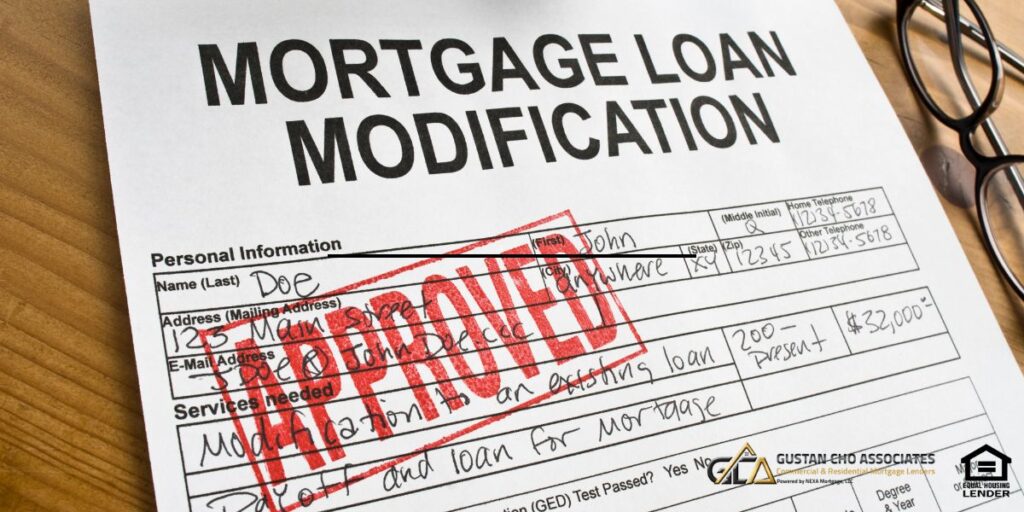
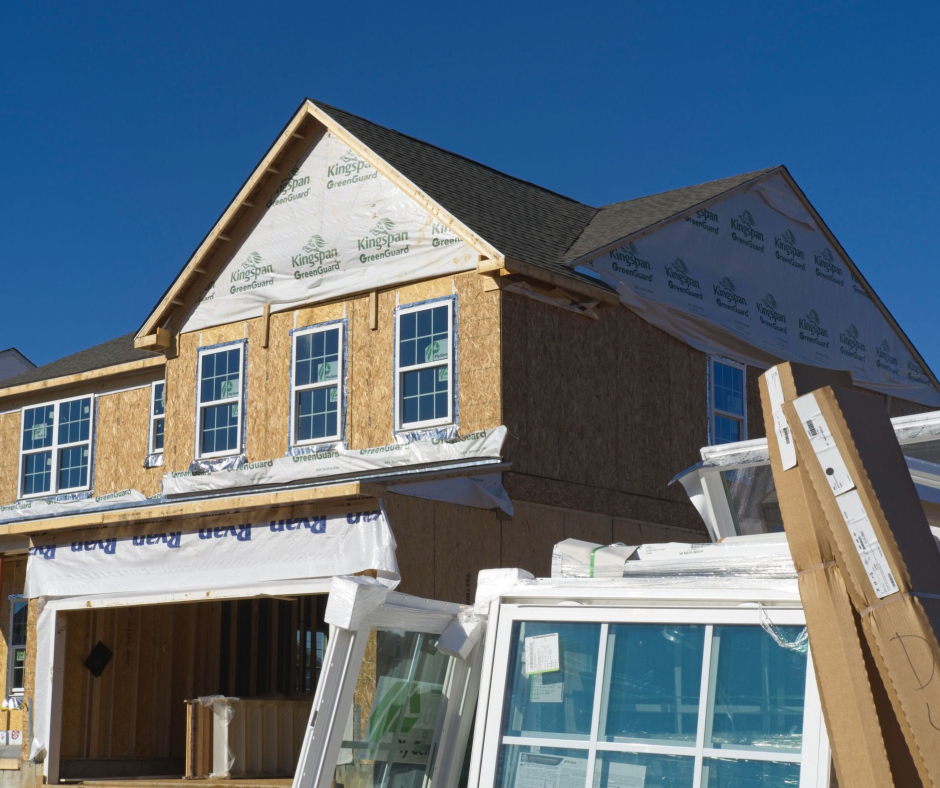
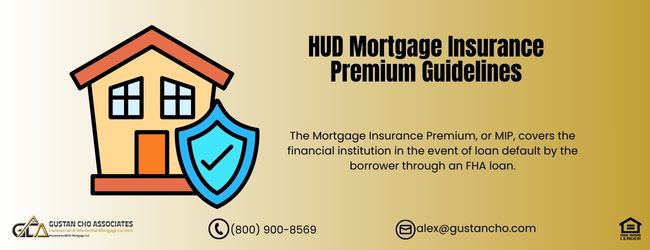


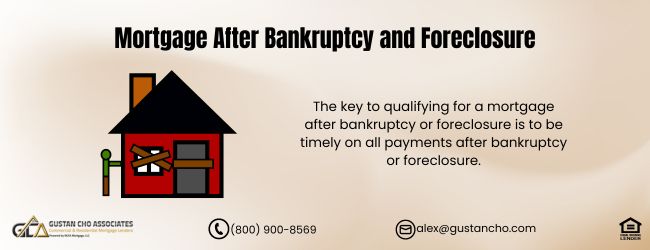
Responses